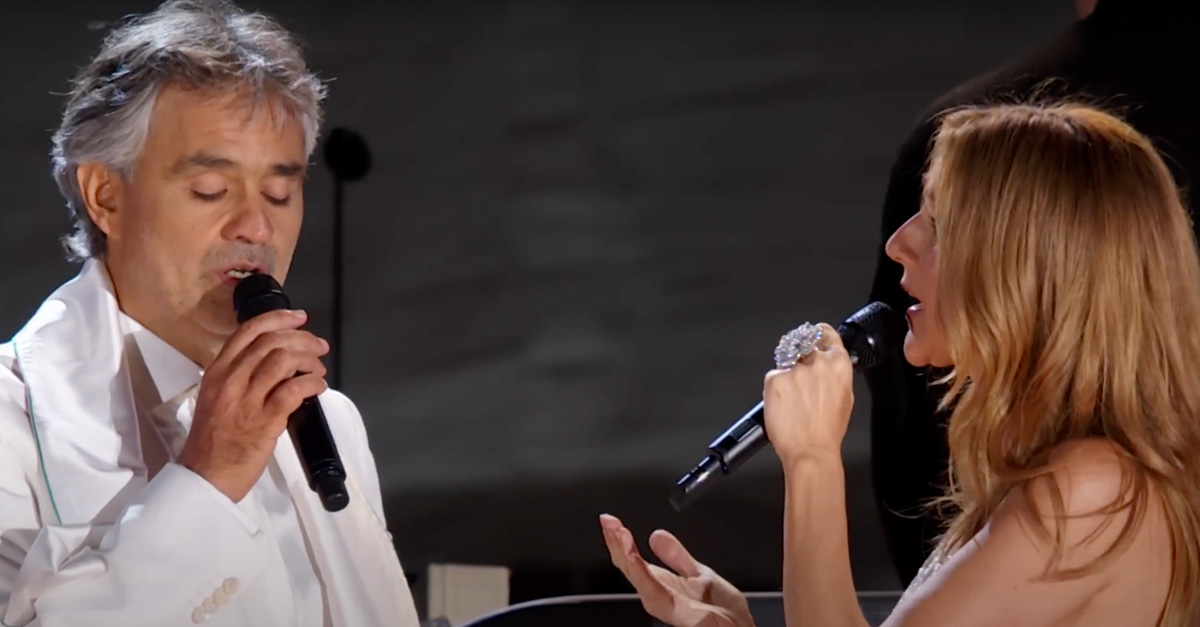


Get a free copy of Parental Rights & Education when you subscribe to our newsletter!

The popular song about God’s sovereignty, omnipresence, and grace has become a Christmas favorite, but underlying its lush melodies is a haunting backstory about life and choice and what — and who — almost never was.
The classic 1946 Christmas movie “It’s a Wonderful Life” explores a simple question: What might the world have been like if a person, in this case the main character, George Bailey, had never been born?
That same question could actually be posed when listening to “The Prayer,” a popular song that in recent years has been accepted into the hard-to-crack Christmas songbook. Written by famed music producer David Foster and songwriter Carole Bayer Sager, it originally served as the theme song of an animated children’s movie but soon evolved into a lush, complicated, operatic duet that included both English and Italian lyrics.
The latter version of “The Prayer” was sung by Canadian pop superstar Celine Dion and Italian tenor Andrea Bocelli and included on Dion’s Christmas album. Although it is not overtly Christian, “The Prayer” does reference Christian themes, including God’s sovereignty, omnipresence, and grace, along with the recognition that faith must be “lit in our hearts” by God Himself. For more than 20 years, it has provided hope, comfort, and inspiration to millions.
Music journalist Chuck Taylor, in a review for Billboard magazine, described the song as “breathtaking” and “exquisite,” noting that the “tour de force combination of Dion and Bocelli will send a half-dozen chills up your spine.”
You can see the pair singing the song live at Central Park in New York City here:
Ironically, these two internationally famous voices almost never came together on “The Prayer” — and not because of scheduling conflicts.
No, it’s because both of them were nearly not born.
That’s right: Both Celine Dion and Andrea Bocelli were almost abortion victims.
Celine Dion’s mother was so disappointed to find out she was going to have a 14th child that she resolved to terminate the pregnancy, while a doctor flat-out told Andrea Bocelli’s mother that she had little choice but to abort her unborn child since he would be severely disabled.
Sort of takes your breath away, doesn’t it?
Celine herself has related several times the story of how she almost never was. Her mother, Thérèse, had always dreamed of a big family, and by the time she was 34 years old, she and her husband, Adhémar, had welcomed 13 children. By then, Thérèse was ready to pursue something different. “She said to herself, ‘When the kids start school, I’m going to go and work, I’m going to meet the world for the first time, and I’m going to have friends,’” Celine explained.
But on the very day in 1967 when her youngest two children, twins Paul and Pauline, finally headed off to school, Thérèse, now 39 years old, found out that she was pregnant again — and she really, really didn’t want to be. “She was so shattered she went to see the parish priest to see if she could do something about it,” Celine told the British celebrity magazine Hello! in 2001.
Not surprisingly, the priest told her that an abortion would violate Catholic teachings and that “she had no right to go against nature,” Celine explained, noting that, although disappointed, Thérèse eventually accepted her situation and “she loved me as passionately as she’d loved the last little ones.”
Still, Celine admitted, “I owe my life to that priest.”
Some 10 years earlier and 4,000 miles away in Tuscany, Italy, a young Edi Bocelli was excited to be expecting her first child with her husband, Alessandro — until she came down with appendicitis and was rushed to the hospital. After the treatments were completed, doctors concluded that her unborn child would have severe ailments. They suggested that she undergo an abortion because it was the “best solution.” Abortion, although illegal, was nonetheless permissible if the child was likely to be born with a disability.
Edi, a devout Catholic, refused.
She welcomed her baby boy in September 1958, but the doctors’ predictions weren’t completely off-base. Andrea Bocelli was born with congenital glaucoma and partially blind; at the age of 12, he lost his sight completely after taking a hit during a soccer game.
In 2010, Andrea decided to finally tell the “little story” about his mother’s “brave decision” in a video, saying, “Maybe I’m a partisan, but I can say that it was the right choice.”
In “It’s a Wonderful Life,” Clarence the angel observed, “Each man’s life touches so many other lives. And when he isn’t around he leaves an awful hole, doesn’t he?”
It’s not difficult to see the hole that would have been left if Celine Dion and Andrea Bocelli hadn’t been born.
Both, as noted earlier, became two of the most beloved and recognizable singers in the world. Between them, they’ve sold over 325 million albums and recorded timeless hits. Both are known for their sense of humor, their honesty and kindness, their generosity to fans, their love of family, and their commitment to various charitable endeavors.
Celine Dion, for example, has spent nearly 40 years raising awareness and funds to combat cystic fibrosis in honor of her niece Karine, who died of the genetic disease when she was 16. Andrea Bocelli created a foundation that, among other things, has built numerous schools and a neonatology department in Haiti, as well as provided basic necessities and mobile medical units to other impoverished communities.
Celine Dion has three sons with her late husband-manager René Angélil, while Andrea Bocelli has two sons and a daughter.
Abortion is now legal and widely available in both Canada and Italy, but both Celine Dion and Andrea Bocelli remain anti-abortion, with Bocelli even clarifying to an Italian newspaper in 2011, “Because of my personal convictions as a devout Catholic, I am not only fighting against something, I am fighting for something—and I am for life.”
So the next time you listen to “The Prayer,” imagine a world without such exquisite voices and souls — and give thanks to God for Celine Dion and Andrea Bocelli, who each have enjoyed the gift of a “wonderful life.”
And then consider the hundreds of millions of those who were also conceived but never given the chance to touch the lives of those around them — and the “awful hole” that’s been left behind as a result.
The Church must be involved in public discourse and influence. That’s why we write — so our readers can be equipped to understand and pursue righteous change in the world. For more timely, informative, and faith-based content, subscribe to the Standing for Freedom Center newsletter.
